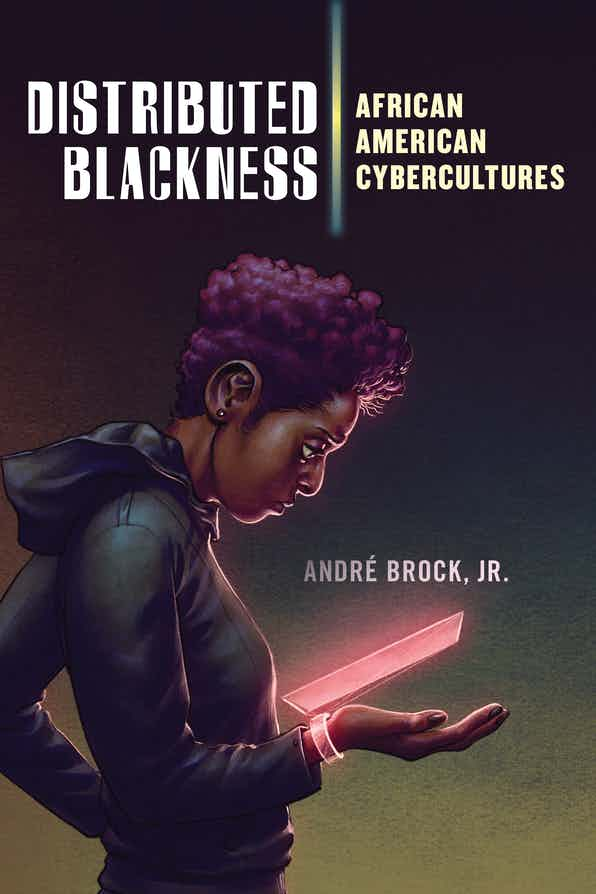On Sept. 14, Dr. André Brock, LMC professor and author of Distributed Blackness: African American Cybercultures, talked with Jayla Williams about Black cyberculture via BlueJeans.
He began by discussing the pessimism we tend to hold when talking about the internet — that it is riddled with cheap political discourse, that it has created a surveillance state, etc. — but says that as a researcher with a critical eye, he is interested in exploring how we use information technology and its effects on how we understand ourselves.
The saying goes that “the computer creates the user,” but Dr. Brock emphasizes that culture is at work behind the scenes when we create and use technology. None of us can escape our cultural assumptions when we create anything. The Silicon Valley narrative that technology is either innovative or disruptive is something Dr. Brock disagrees with — this binary is too exclusive of the complex cultural discourse happening over the internet.
According to him, “Black people have a natural affinity for the internet and digital media.” He sees Black-created internet platforms, such as “Black Twitter,” as safe spaces constructed by African-Americans to decenter whiteness. Black cyberculture is a space for performance and conversation where the mundane lives of Black people are normalized.
In order to produce compelling research on the internet’s role in culture and vice versa, Dr. Brock created an analytic technique called Critical Technocultural Discourse Analysis (CTDA).
It combines the study of user discourse with the study of the technology itself to explore the links between form, function, belief and meaning of communication technologies.
One example of a case in which CTDA is helpful is the Yahoo Finance tweet fiasco of 2017. Yahoo tweeted “Trump wants a much n*****navy. Here’s how much it’ll cost.” Almost immediately, a hashtag “#n*****navy ” was created, and users made fun of the tweet. According to Yahoo, it was an autocorrect error, but cancel culture rejected this and argued that it had been a purposefully racist tweet.
With CTDA analysis, we can see that out of Yahoo’s blunder came the creation of a space to engage in discourse about race, but not necessarily in an “academic” way. Black Twitter can enact joy and, far from being naive, intentionally takes life’s racist challenges and turns them into celebration.
In describing Black techno-culture, Dr. Brock stresses that it needs to include the every-day, the mundane. The discussion of racism doesn’t make up all of Black culture, nor should Black culture reflect one subset of itself.
“Social justice activism isn’t all of Black discourse. We’re not all angry Black Lives Matter gangbangers,” he said. Instead, Black digital space is, or should be, a celebration of regular life. Explaining further, Brock said that the “white belief in rationalism and logic that excludes Black subjectivity objectifies the world they find themselves in.” These platforms should reflect the whole person each user was “before the police hailed them over.”
The medium of Twitter or the like affords a safe space to recover from brutality and to grow. Online, the space is not limited by in-person racism. Rather, it is a place where each user can freely express a point of view and “be a point that is viewed.”
Dr. Brock also discussed the elitism and exclusion built into certain apps and websites.
“The sleeker and more difficult the technology is, the more we say it’s accessible to the elite,” he said. “Canvas and Banner — but not Twitter — are ‘appropriate technologies.’”
In opposition to these elitist technologies, or perhaps out of exclusion from them, communities of people create safe parts of the internet for conversation to happen.
Dr. Brock pointed out that Twitter is interesting in that it allows for people who aren’t following each other to have a discourse. Hashtags invite discussion and by design cannot shut anyone out. Black Twitter provides an uplifting, joyful space for genuine discourse and for catharsis.
When asked about technology usage in the famous Disney-created Black utopia of “Wakanda,” Brock answered that “Wakanda is not an Afro-future I can believe in.”
He elaborated that this fictitious nation, invented by a white Disney employee in 1968, is autonomous and technologically advanced, but refuses to help its neighbors suffering Western domination.
He said that the Black Panthers are a more realistic Afro-future because they also focused on the mundane in addition to bigger ideals by providing schooling, packing lunches, and attending to other quotidian needs within the community.
One attendee asked whether it would be useful to create a Black platform to interconnect all Black people around the world. Dr. Brock argued that it would instead be more productive and cost-efficient to reshape funded platforms that already serve us.
Another participant asked about this summer’s murders and the emotional suffering he is exposed to as a researcher of Black culture.
In reference to the George Floyd video, Brock said: “It was like watching a lynching, and it could have been me.”
He expressed the “racial battle fatigue” he and others feel when constantly exposed to racist violence and spoke about the negative effects of social network algorithms that continually show us media of death.
“While I talk about Black joy, I also focus on catharsis in a world where we’re presented as objects in the regime of white supremacy.”
